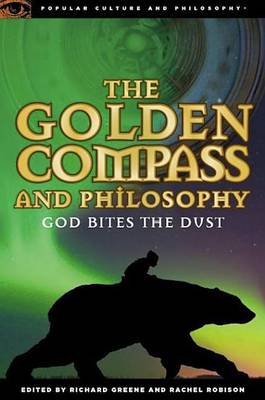Popular Culture and Philosophy
4 primary works • 5 total works
Book 29
The films of Quentin Tarantino are ripe for philosophical speculation, raising compelling questions about justice and ethics, violence and aggression, the nature of causality, and the flow of time. In this witty collection of articles, no subject is too taboo for the writers to tackle. From an aesthetic meditation on the use of spraying blood in Kill Bill to the conundrum of translation and reference in Vincent and Jules' discussion about French Big Macs in Pulp Fiction, Tarantino and Philosophy shies away from nothing. Is The Bride a heroic figure, even though she's motivated solely by revenge? How is Tarantino able to create a coherent story when he jumps between past, future, and present? The philosophers in this book take on those questions and more in essays as provocative as the films themselves.
Book 43
The popularity of the His Dark Materials trilogy has generated a major motion picture, a stage play, video games, and a new prequel. The series has also been highly controversial with its use of exciting adventure stories for children to comment on organized religion. These books have piqued the interest of the contributors to this fascinating volume, who use it to probe the philosophical issues that inform them. Could a golden compass, or alethiometer, really work? Can a person's soul or daemon have a mind of its own? What are the ramifications of pursuing the diabolical "intercision" process, or of trying to bring about the death of God, a plot that Lyra and her mysterious Father struggle over? These are some of the questions explored by these essays that try to get to the heart of Lyra's bewildering, inspiring, and multifaceted world.
Book 49
Book 86
The drama-comedy Girls -- often unfairly written off as Sex and the City for the millennial generation -- has made TV history and provoked controversy for its pitilessly accurate portrayal of four oddly sympathetic twentysomething female characters, notable for their self-absorption, empathy deficits, and ineptitude with relationships. Among other breakthroughs, it is the first show to depict the sex act among the alienated young as nearly always awkward and unfulfilling. In Girls and Philosophy, a team of diverse, sensitive, empathic philosophers approach the world of Girls from a variety of angles and philosophical points of view.
The writers attack many fascinating issues arising from Girls, including the meaning of authenticity in the 21st century, coming of age in a society with no clear guidelines, Girls as the only TV show the pop-culture-hating professor Theodor Adorno might have admired, feminist appraisals of these not-very-feminist characters, how each deals with the anxiety that comes from inescapable freedom, whether we need to amend the traditional list of seven deadly sins in the context of present-day New York, and, of course, why we once again find it natural to think of women in their early- to mid-twenties as "girls."
The writers attack many fascinating issues arising from Girls, including the meaning of authenticity in the 21st century, coming of age in a society with no clear guidelines, Girls as the only TV show the pop-culture-hating professor Theodor Adorno might have admired, feminist appraisals of these not-very-feminist characters, how each deals with the anxiety that comes from inescapable freedom, whether we need to amend the traditional list of seven deadly sins in the context of present-day New York, and, of course, why we once again find it natural to think of women in their early- to mid-twenties as "girls."
Covering everything from Aristotle to ziti, this title explores such topics as: is Tony Soprano a good man?; is Carmella a feminist?; morally speaking who is the worst person on "The Sopranos"; is watching "The Sopranos" harmful to your mental or moral health? and should Tony have read Machiavelli instead of Sun Tzu? The chapters cover topics from each of the traditional branches of western philosophy: metaphysics (the problem of evil, philosophical psychology), epistemology (self-knowledge), value theory (ethics, aesthetics, political philosophy), as well as eastern philosophy (Sun Tzu), history of philosophy (Plato, Nietsche, Machiavelli), and contemporary postmodern themes (feminism and identity issues). "The Sopranos" is rich in philosophical content and complex human interactions and accurately summarizes the human condition, so it is natural for philosophical treatment. No prior philosophical qualifications or mob connections are required to follow all the arguments, which are presented with the same vibrancy, humour and verve that has made "The Sopranos" itself a hit.

